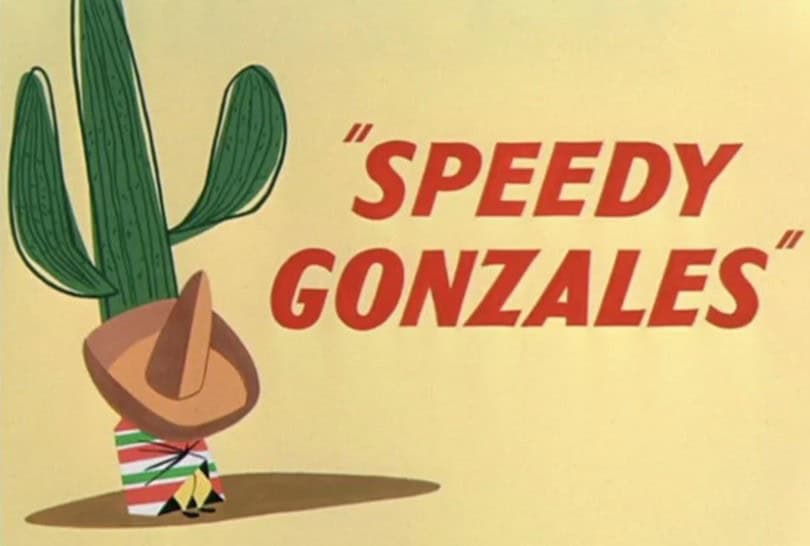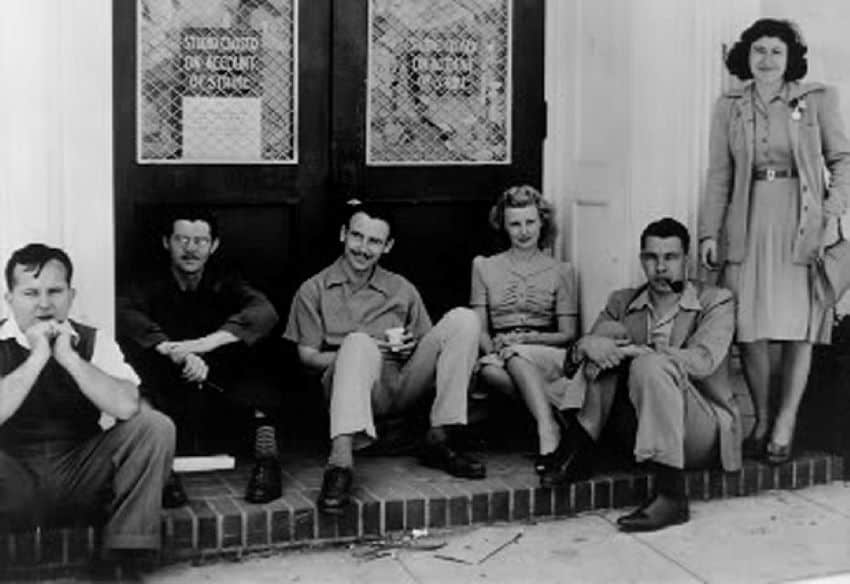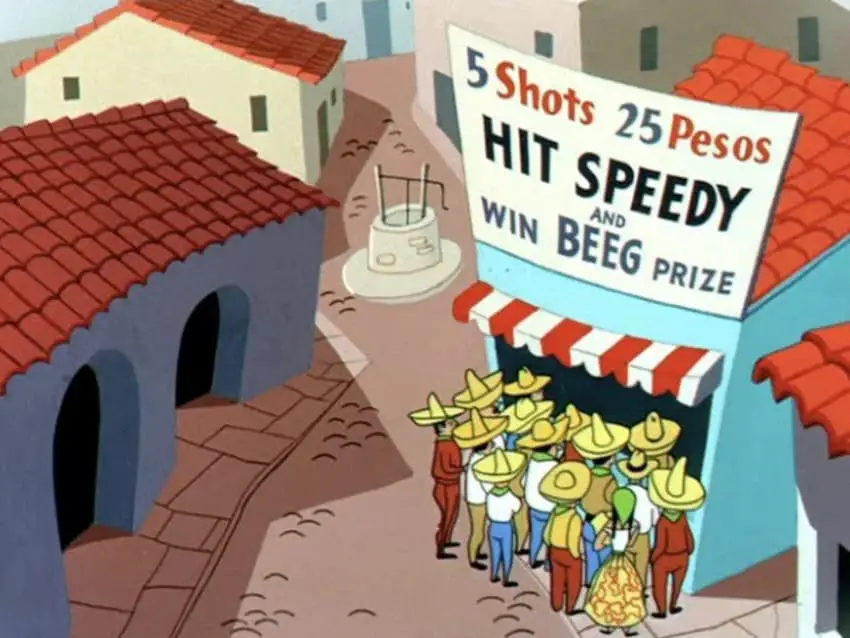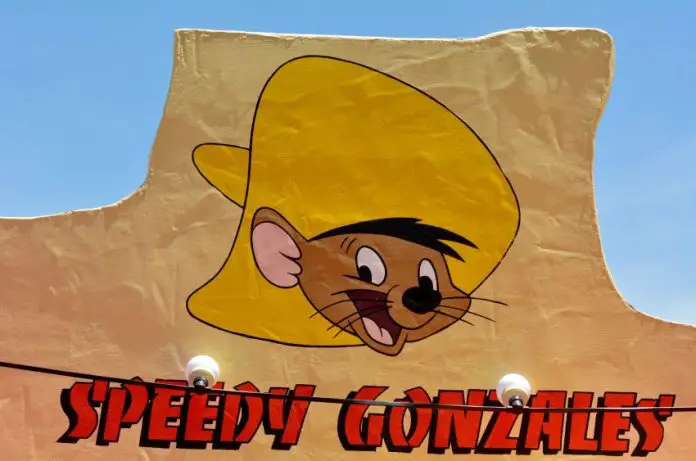As I passed through the streets of the Zocalo in Mexico City’s colonia Centro, a familiar phrase caught my ear. “Ándale, mijo,” a father urged his dawdling son, gently steering him through the bustling morning crowd. “Ándale.” In an instant, my mind automatically conjured the high-pitched voice of a cartoon mouse: “Ándale! Ándale! Arriba! Arriba!” The memory of Speedy Gonzales, the “fastest mouse in all Mexico,” flashed through my mind, complete with his oversized sombrero, exaggerated accent and outsized bravado.
I found myself reflecting on the pint-sized Looney Tunes character who had been a staple of my childhood Saturday mornings. How had this caricature of a Mexican mouse shaped my perceptions — and those of millions of other American children — about our neighbors to the south? Now, as a more informed adult who had immersed herself in Mexican culture, I could look at Speedy and see the ways in which he and the Mexican characters he interacted with fostered potentially negative ethnic prejudices. Yet, was Speedy a harmless bit of fun or a problematic purveyor of cultural stereotypes? How did the Mexican community feel about him? And what would become of him over time?

The origins of a controversial rodent
Speedy Gonzales made his on-screen debut in 1953 as the brainchild of animators Friz Freleng and Robert McKimson. Originally intended to be a one-show character, Speedy became so popular that he was kept on for 45 episodes of the Looney Tunes show, eventually winning an Academy Award for Best Animated Short Film in 1955 for the cartoon “Speedy Gonzales.”
Although some have claimed that the character’s name is the result of a sexual joke (one can fill in the blanks as to why it references “speed”), former Warner Brothers animator Martha Goldman Sigall confirmed the name was born of an interaction between assistant animator Frank Gonzales and a group of the company’s story writers. Gonzales was sharing his new way of speeding up his drawing process with the group, which inspired the writers’ use of the nickname “Speedy Gonzales”.
Voiced by Mel Blanc (a white actor who was the voice behind most Looney Tunes characters), Speedy was depicted as a clever, lightning-fast mouse who often outwitted his feline nemesis, Sylvester. His catchphrases — “Ándale! Ándale!” and “Arriba! Arriba!” — became instantly recognizable, even to non-Spanish speakers.
In his later years, Speedy made appearances in films like “Who Framed Roger Rabbit”, “Looney Tunes: Back in Action”, and the “Space Jam” franchise. He has appeared in various media, including songs, video games, and commercials over the decades, gaining praise as one of the most successful Mexican characters ever created in Hollywood.

With his yellow sombrero, white shirt and trousers, and red neckerchief, Speedy cuts a distinctly stereotypical figure of mid-20th century American perceptions of Mexican culture. It’s this American take on Mexican cultural garb, coupled with the character’s exaggerated Spanglish, and the unflattering portrayal of his fellow mice, that has fueled decades of controversy.
Speedy’s appearances, particularly throughout the 1950s and 60s, often featured him helping his fellow Mexican mouse compatriots, usually slow-witted and living in squalor, to steal cheese from a “Gringo” cat. These plot lines, while entertaining to many, caught the attention of cultural critics who saw them as perpetuating harmful stereotypes.
Controversy and cancellation
As awareness of cultural sensitivity grew in the late 20th century, Speedy Gonzales found himself at the center of a heated debate. Between 1999 and 2002, Cartoon Network pulled Speedy Gonzales cartoons from its U.S. broadcast lineup, citing concerns over ethnic stereotyping.
The move backfired, sparking an outcry — but not from the group one might expect. Instead of praise from progressives, the network encountered a backlash from an unexpected source: the Hispanic community itself. Many Mexican-Americans and Latinos protested the decision, arguing that Speedy was a positive character– quick-witted, heroic and always victorious. The League of United Latin American Citizens even called for Speedy’s return, describing him as a “cultural icon.” Thus, Speedy narrowly escaped being canceled, surprisingly saved by the community he is thought to portray negatively.

The Mexican perspective
Interestingly, the controversy surrounding Speedy Gonzales seems largely driven by the United States. Among Mexican communities and in much of Latin America, the character enjoys enduring popularity. Speedy’s reception in Mexico itself has been largely positive. South of the border, he’s seen as more of a playful cultural ambassador than an insulting caricature. This difference in perception demonstrates the subjective nature of cultural representation. Many Mexicans view Speedy as a plucky, clever underdog hero who consistently outsmarts his adversaries — a theme that resonates deeply in Mexican culture.
Mexican actor Eugenio Derbez has defended the character, likening him to a superhero for the Mexican community. “The only ones offended are the Americans, but we love Speedy Gonzales,” Derbez said in Spanish. “He’s smart. He outsmarts the cats. He’s a hero. He gets cheese for his people. He’s fast.” He told United Press International in April 2024.
This sentiment is echoed by many Mexicans who grew up watching Speedy. They tend to focus on his positive qualities: speed, wit, bravery, and loyalty to his friends, rather than seeing him as a negative stereotype. Mexican comic Gabriel Iglesias, who voiced Speedy in “Space Jam” defended the character on Twitter, declaring, “U can’t catch me cancel culture. I’m the fastest mouse in all of Mexico.”
A complex legacy
For many Americans, Speedy may have been their first (albeit cartoonish) exposure to Mexican culture. The danger lies in such siloed exposure becoming a basis for real-world assumptions. While the character certainly incorporates stereotypical elements, Speedy’s reception in Mexico suggests that reactions to cross-cultural representation are subjective, varying widely depending on the viewer’s cultural context.
Are some just too sensitive to the act of poking fun at other cultures? How do we handle the representation of a character or context cross culturally? Must characters be fully canceled due to past stereotypical portrayals, or can characters be reimagined into more culturally respectful beings? Only time will tell, but the little mouse delivers a big reminder. Speedy’s case highlights the importance of looking past a distinctly North American “woke” litmus test to media, and listening instead to the actual voices of those being represented. Sometimes, they might surprise us with their enthusiasm for characters we thought problematic.
Monica Belot is a writer, researcher, strategist and adjunct professor at Parsons School of Design in New York City, where she teaches in the Strategic Design & Management Program. Splitting her time between NYC and Mexico City, where she resides with her naughty silver labrador puppy Atlas, Monica writes about topics spanning everything from the human experience to travel and design research. Follow her varied scribbles on Medium at https://medium.com/@monicabelot.
